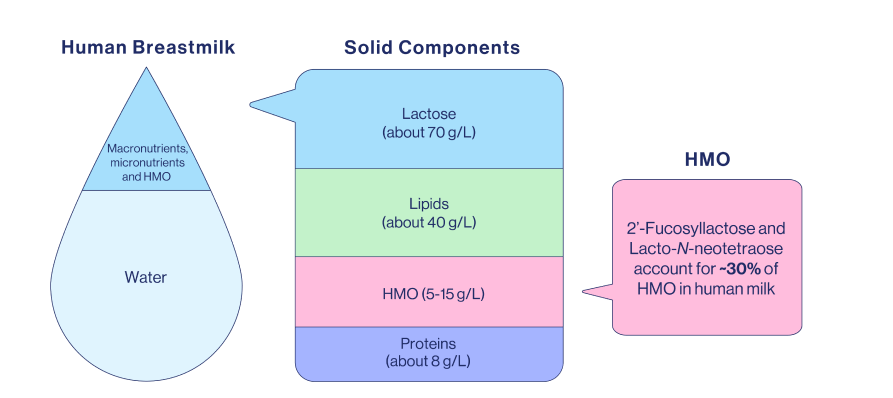NEXT UP
Hypoallergenic Formula Feeding in CMPA
Breastmilk provides the ideal balance of nutrients for the infant, including those with CMPA.
Breastmilk contains a diverse range of bioactive components including, immunoglobulins, hormones, and oligosaccharides or human milk oligosaccharides (HMO).1
Newborns therefore obtain maternal immune support through factors in breastmilk, including HMO, secretory immunoglobulin A (IgA), lactoferrin, antimicrobial peptides (AMPs) and others.2,3

HMO are the third most abundant solid component of breastmilk and play an especially important role in nurturing the growing immune system.4
There are over 200 of these structurally complex carbohydrates known today, two of them – 2’-Fucosyllactose (2’-FL) and Lacto-N-(neo_tetraose (LNnT) - account for more than 30% of HMO in breastmilk.5
In rare cases when CMPA is suspected in an exclusively breastfed infant, a diagnostic maternal exclusion of cow’s milk/dairy for 2-4 weeks is recommended whilst continuing to breastfeed.6 Following this exclusion period, in order to confirm the diagnosis, cow’s milk/dairy should be reintroduced back into the maternal diet while monitoring of infant’s symptoms.
During the maternal exclusion the mother is advised to eliminate all sources of cow’s milk/dairy from her diet as well as that of her baby (if complementary feeding has started). Guidelines recommend professional dietary counselling during the exclusion period to ensure the quality of the mother’s diet, as well as follow-up to ensure that the exclusion of foods does not continue if not effective.7
In case of a prolonged maternal elimination diet, then supplementation with calcium and vitamin D is recommended – up to 1000 mg of calcium and 10 micrograms of vitamin D/day.8 In addition, supplementation with iodine and vitamin B12 can be considered.6
Note: Breastfeeding mothers should only avoid eating or drinking a food that their baby is reacting to in their milk.9 Removing foods from the mother’s diet, unnecessarily, puts the mother’s nutritional health at risk, particularly when removing food groups such as dairy, wheat or multiple foods. Dietary exclusion during breastfeeding should also be supervised by a dietician.10